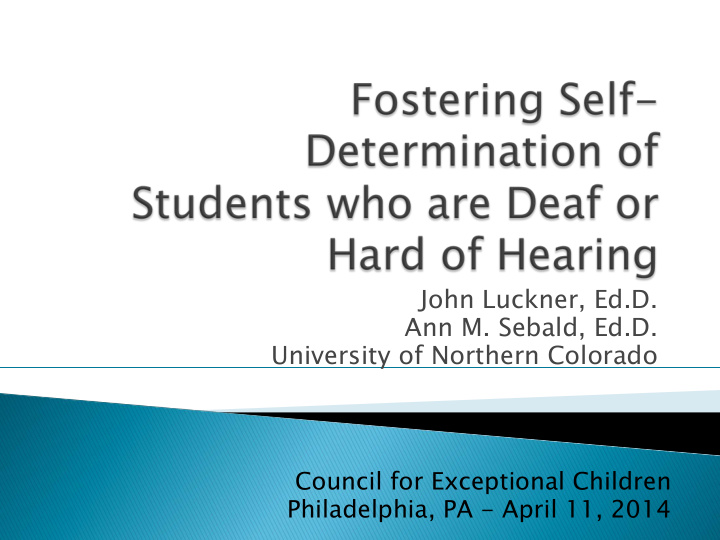



John Luckner, Ed.D. Ann M. Sebald, Ed.D. University of Northern Colorado Council for Exceptional Children Philadelphia, PA - April 11, 2014
} Introduction } What Is Self-Determination? } Why Is It Important? } Research- ToD and SD } Component Elements of Self-Determination } A Model of Self-Determination } Instructional Strategies, Activities and Resources for Promoting SD } Resources } Questions & Answers
} Combinati tion of atti ttitu tudes, knowledge, and skills th that t enables individuals to to make choices and engage in goal directe ted, self- regulate ted behavior } Considered best t practi tice in special educati tion and tr transiti tion services
Research with thin special educati tion indicate tes th that t promoti ting self-dete terminati tion leads to to… … ◦ Positi tive adult t outc tcomes ◦ Positi tive tr transiti tion outc tcomes, including higher levels of employment t and independent t living ◦ Increased community ty parti ticipati tion ◦ Success in posts tsecondary educati tion ◦ Increased quality ty of life
} Sur Surve veyed 76 ToD ToD/H /HH ◦ Importa tance of SD D ◦ SD D skills ta taught t to to stu tudents ts ◦ SD D skills used by stu tudents ts ◦ Benefits ts of te teaching SD D Sebald, A. (2013). Teachers of th the deaf and hard of hearing: percepti tions of self-dete terminati tion for th their stu tudents ts. Teach Teacher er Ed Educati tion and Special Ed Educati tion, 36 (2), 145- (2), 145-159. 159.
Sp Specifi fic Sk Skills s Identi tified Taught t Used Used Problem 96% 87% 74% Solving Choice 93% 76% 75% Making Self-Advocacy 93% 81% 73% Independence 89% 64% 57% Self- 87% 54% 37% Evaluation
} Self-dete terminati tion is an inte tended focus in te teacher tr training programs. ◦ CEC EC Sta tandards address self-dete terminati tion } One-th third of th those surveyed work as iti tinerant t and may not t have input t to to th the development t of self-dete terminati tion among th their stu tudents ts. } As a field, we may need to to consider th the implicati tions of Positi tive Behavioral Inte terventi tions and Supports ts (PBIS) in th the development t of self- dete terminati tion.
} Se Self-a f-awa warene ness/ ss/se self-k f-kno nowl wledge ge } Choice/De Decision-making } Goal setti tting/atta ttainment t } Pr Problem lem so solving lving } Self-regulati tion/self-management t } Se Self-a f-advo vocacy
} Providing opportu tuniti ties for SD D during daily routi tines } Ex Explicitl tly te teaching th the component t elements ts of SD D } Str tructu turing experiences th that t require th the use of SD D skills Work in small groups to discuss possible strategies that could be used in your classroom or home.
} Acti tiviti ties } Curriculums Curriculums } Assessments ts } Inte ternet t Resources Luckner, J. J. L., & Se Sebald, A , A. M., (2013). . M., (2013). Promoti ting self-dete terminati tion of stu tudents ts who who are deaf f or ha hard of f he hearing. ng. American American Annals of th the De Deaf, 158 (3), 377 – – 386.
John Luckner (john.luckner@unco.edu) Ann Sebald (ann.sebald@unco.edu) School of Special Education University of Northern Colorado
More recommend